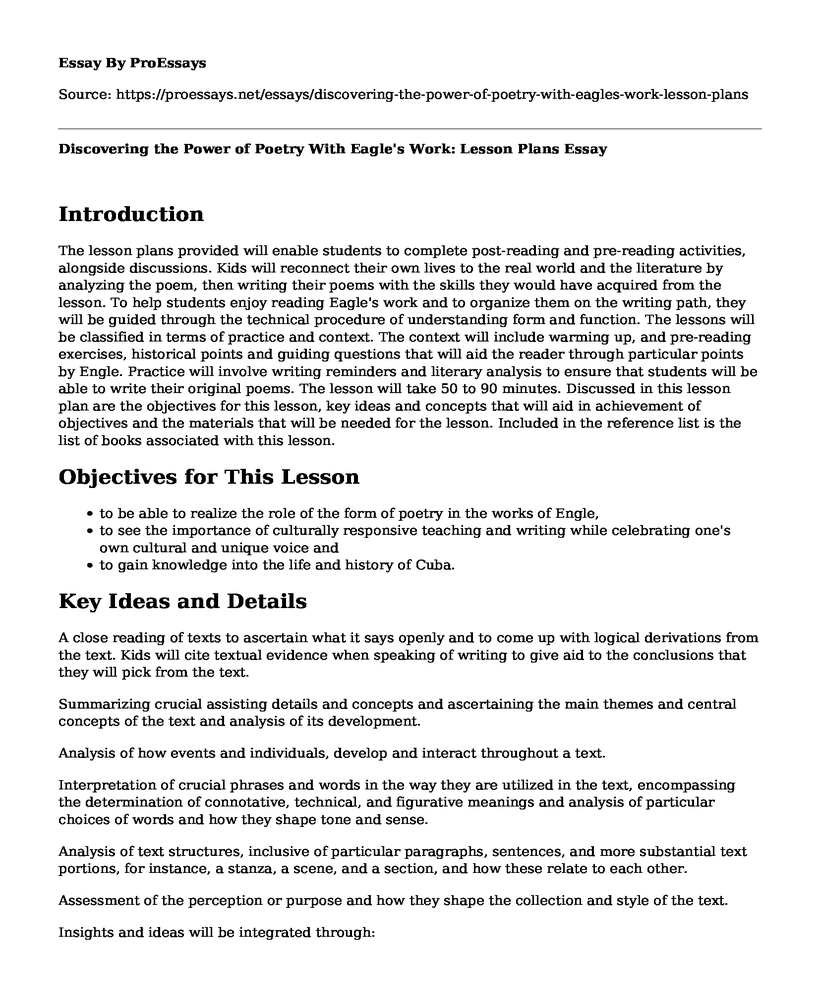Introduction
The lesson plans provided will enable students to complete post-reading and pre-reading activities, alongside discussions. Kids will reconnect their own lives to the real world and the literature by analyzing the poem, then writing their poems with the skills they would have acquired from the lesson. To help students enjoy reading Eagle's work and to organize them on the writing path, they will be guided through the technical procedure of understanding form and function. The lessons will be classified in terms of practice and context. The context will include warming up, and pre-reading exercises, historical points and guiding questions that will aid the reader through particular points by Engle. Practice will involve writing reminders and literary analysis to ensure that students will be able to write their original poems. The lesson will take 50 to 90 minutes. Discussed in this lesson plan are the objectives for this lesson, key ideas and concepts that will aid in achievement of objectives and the materials that will be needed for the lesson. Included in the reference list is the list of books associated with this lesson.
Objectives for This Lesson
- to be able to realize the role of the form of poetry in the works of Engle,
- to see the importance of culturally responsive teaching and writing while celebrating one's own cultural and unique voice and
- to gain knowledge into the life and history of Cuba.
Key Ideas and Details
A close reading of texts to ascertain what it says openly and to come up with logical derivations from the text. Kids will cite textual evidence when speaking of writing to give aid to the conclusions that they will pick from the text.
Summarizing crucial assisting details and concepts and ascertaining the main themes and central concepts of the text and analysis of its development.
Analysis of how events and individuals, develop and interact throughout a text.
Interpretation of crucial phrases and words in the way they are utilized in the text, encompassing the determination of connotative, technical, and figurative meanings and analysis of particular choices of words and how they shape tone and sense.
Analysis of text structures, inclusive of particular paragraphs, sentences, and more substantial text portions, for instance, a stanza, a scene, and a section, and how these relate to each other.
Assessment of the perception or purpose and how they shape the collection and style of the text.
Insights and ideas will be integrated through:
- Integration and evaluation of content that is presented in diverse forms of media inclusive of quantitative, visual and in words.
- Analysis of how similar topics are addressed in various texts and themes to enhance knowledge or to offer comparisons to the approaches taken by the author.
Reading and comprehending informal texts and complex literary texts proficiently and independently
- Application of language knowledge in interpreting how language is used in distinct contexts, to make choices for style and meaning effectively, and to get the full picture of the text while listening or reading.
- Clarification of meanings of unknown phrases and words using contextual clues and demonstration of understanding of word relationships, figurative language, and meanings.
- Grammar usage through the use of the parallel structure and use of various phrases and clauses to convey particular meanings and to add variety and interests to presentations and writing.
- Demonstration of capitalization, spelling, and punctuation when writing through the use of the colon when introducing a list of quotations and the semicolon when linking two or more closely related independent clauses.
- Evaluation of arguments and particular claims in a text, including the credibility of thinking, relevance, and abundance of evidence.
The following Materials will be Needed for kids to properly grasp and be familiar with each concept in the lesson:
- Copies of The Surrender Tree: Poems for Cuba's struggle for Freedom
- Related lesson copies, for each student
- Copies of the printable worksheet for each student
Conclusion
The details I have chosen to include in this lesson plan will ensure that each student gains a clear understanding of The Surrender Tree: Poems of Cuba's Struggle for Freedom by Margarita Engle and be able to apply the concepts in writing their relatable poems. This lesson plan will ensure that each activity that goes on in the classroom equips learners with enough progress towards the attainment of the set goals and objectives and their education plans.
References
Armstrong, K., Fletcher, R., Heard, G., McNair, J. C., Spivey-Wesson, G., Ward, B., & Wong, J. S. (2009). The Surrender Tree: Poems of Cuba's Struggle for Freedom. Language Arts, 86(6), 471. Retrieved from https://search.proquest.com/openview/33bdd00edfb3571d083eda6ea22562f3/1?pq-origsite=gscholar&cbl=41436
Engle, M. (2008). The surrender tree: Poems of Cuba's struggle for freedom. Henry Holt and Company (BYR). Retrieved from https://www.amazon.com/Surrender-Tree-Poems-Struggle-Freedom-ebook/dp/B003BQZ85M
Ferrer, A. (1999). Cuba, 1898: Rethinking Race, Nation, and Empire. Radical history review, 1999(73), 22-46.Retrieved from https://read.dukeupress.edu/radical-history-review/article-abstract/1999/73/22/29757/Cuba-1898-Rethinking-Race-Nation-and-Empire?redirectedFrom=fulltext
Ferrer, A. (2006). Armed slaves and anti-colonial insurgency in late nineteenth-century Cuba. In Arming Slaves: From Classical Times to the Modern Age (pp. 304-329). Yale University Press. Retrieved from https://www.jstor.org/stable/j.ctt1nq3ct
Cite this page
Discovering the Power of Poetry With Eagle's Work: Lesson Plans. (2023, Feb 27). Retrieved from https://proessays.net/essays/discovering-the-power-of-poetry-with-eagles-work-lesson-plans
If you are the original author of this essay and no longer wish to have it published on the ProEssays website, please click below to request its removal:
- Analysis of the Patriot Games Book Paper Example
- Choice of Robert Frost's Poem by Nicholas Carr in The Glass Cage Paper Example
- Perception of Students on Group and Individual Work - Essay Sample
- Paper Example on the Disabled: Overcoming Learning Obstacles With Hearing & Sight
- Essay Example on No Degree? No Problem: You Can Be Successful
- The Role of Fate and Free Will in Antigone Essay Example
- Essay on Religion in the US: The Conflict between the First Amendment and Public Schools







